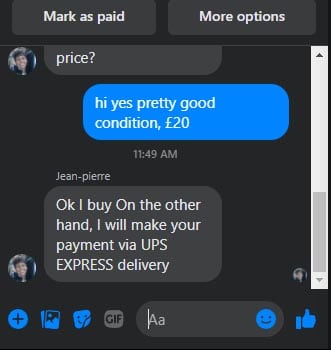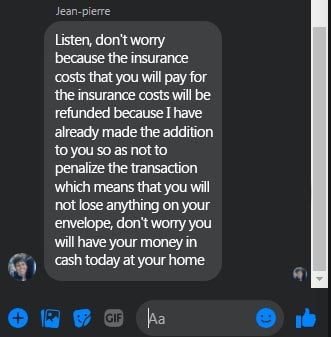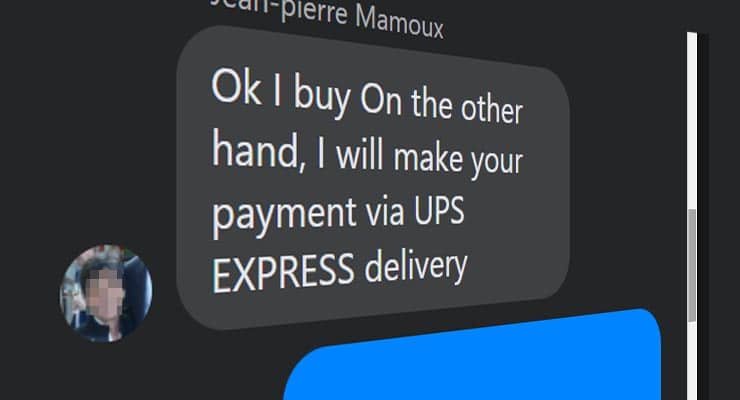The ‘UPS Delivery’ Facebook Marketplace scam. How it works.
Crooks are attempting to scam online sellers by pretending to be interested in items for sale and claiming they will pay for them by sending cash to the seller via courier companies such as UPS. We explain how the scam works.
While marketplaces such as eBay have evolved to have strict protocols in place to protect their users against scammers (that’s not to say eBay is completely scam-free, of course!), other marketplaces such as the Facebook Marketplace and websites like Gumtree are still great targets for scammers.
One such scam targeting sellers on these marketplaces is the ‘UPS Delivery’ scam, alternatively known as the Courier/Mailman scam.
How does the UPS Delivery Marketplace scam work?
As with so many marketplace scams, it starts with the seller getting a simple message from a scammer pretending to be a prospective buyer. The buyer sends a message showing interest in potentially purchasing the item. However, upon confirmation from the seller that the item is still available, the buyer makes an unusual request.
Instead of the more frequently used payment methods, such as PayPal or doorstep cash, the buyer instead says they’ll send the seller the payment in cash but using a courier service such as UPS. Take the message below that was sent by a scammer only recently.

Given the plethora of great ways we can make payments online, or even just paying on the doorstep, requesting a courier service to deliver an envelope full of cash to the seller may seem like an odd choice. But hey, if UPS are turning up on the seller’s doorstep with an envelope full of money, what has the seller got to lose? They’ll have the money, after all. It will literally be in their hands.
Sponsored Content. Continued below...
So the seller agrees to the peculiar payment method and the buyer asks for their name, address and their email address. Once they get that information, the buyer then goes in with the crux of the scam. They claim that while they’ve paid the shipping fee to the courier service, it is the seller that has to pay some type of ‘insurance cost’ to the courier. The buyer explains that because the courier is shipping cold hard cash, an insurance payment is required.
But don’t worry, says the buyer. They will add those “insurance costs” to the money they put in the envelope, so the seller won’t be out of pocket. (See below for another example message.)

In the meantime, the seller receives an email that appears to be from the courier company (e.g. UPS) asking for the insurance costs so the courier company can make the delivery.
But as our readers will already know, this is all a complete scam. The “buyer” has not organised for UPS to come to the seller’s house. And that “UPS” email isn’t really from UPS. It’s a phishing email that will take the seller to a phishing website, ask for a payment, which will then end up in the scammer’s bank account. That, or the phishing website will steal the debit/credit card information and give that to the scammer instead. Some variants will even take you to a website instructing you to purchase gift cards (a big no-no.)
And there is no courier company heading to the seller’s house with an envelope full of money. Meaning the seller loses whatever they paid when visiting the phishing website.
Sponsored Content. Continued below...
Avoiding this scam
- The simplest way to avoid this scam is to be on high alert whenever a prospective buyer mentions sending you money using a courier company like UPS.
- Never pay the buyer or any entity referred to you by the buyer when selling an item using free services like Facebook Marketplace and Gumtree.
- Any request by the buyer to make a payment of some kind (such as the above example’s “insurance costs”) using money wire services, services like Venmo or by using gift card vouchers will be scams.
- Remember, just because an email appears to come from a company, it doesn’t really mean the company sent it. Avoid clicking on links in emails and if you do, always ensure the resulting webpage is on the correct web URL. (More about spotting phishing URLs can be seen in our post here.)
- Watch out for sellers using broken English, since many of these scams originate from non-English speaking countries.
- Stick to popularly used payment methods. If selling local, then doorstep collection may be your best bet. If you prefer online payments then PayPal is a good choice. Don’t accept unusual payment methods such as mailed checks, money wire transfers with services like Western Union and courier companies.
Continued below...
Thanks for reading, we hope this article helped, but before you leave us for greener pastures, please help us out.
We're hoping to be totally ad-free by 2025 - after all, no one likes online adverts, and all they do is get in the way and slow everything down. But of course we still have fees and costs to pay, so please, please consider becoming a Facebook supporter! It costs only 0.99p (~$1.30) a month (you can stop at any time) and ensures we can still keep posting Cybersecurity themed content to help keep our communities safe and scam-free. You can subscribe here
Remember, we're active on social media - so follow us on Facebook, Bluesky, Instagram and X
